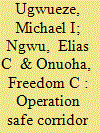|
|
|
Sort Order |
|
|
|
Items / Page
|
|
|
|
|
|
|
| Srl | Item |
| 1 |
ID:
181098


|
|
|
|
|
| Summary/Abstract |
Fifty years after the Biafra war, its discourse in public sphere remains dominant as though the war just ended. Existing studies attribute this to several factors, including perceived marginalisation and collective victimhood of the Igbo (that is, the people of South-East, Nigeria) and the failure of Nigerian state to pursue the post-Biafra war peace-building initiatives. Although research has used framing perspective to explain why Biafra separatist agitators have remained non-violent despite organised provocations, the impact of Biafra war documentaries on continual resurgence of secessionist agitations is yet to be given adequate attention in literature. Thus, this article provides empirical evidence of how documentaries of Biafra war fuel secessionist agitations among the Igbo by helping the movement gain more converts. Using a mixed-methods approach, the paper argues that constant (re)distribution of Biafra war documentaries in the social and other media draws more supporters to secessionist agitations. The implication is that until Nigerian government counters the narratives contained in these documentaries by visibly implementing the post-Biafra war peace-building initiatives, the secessionist agitations will likely continue to gain momentum.
|
|
|
|
|
|
|
|
|
|
|
|
|
|
|
|
| 2 |
ID:
186844


|
|
|
|
|
| Summary/Abstract |
The devastation of lives, livelihood and property in Nigeria caused by over a decade of insurgency by the Boko Haram terrorists is a subject of security, policy, humanitarian and academic concern. Several counter-measures have been adopted by both state and non-state actors to combat the insurgency with limited successes recorded. Consequently, studies have examined several efforts taken by the Nigerian government toward ending the Boko Haram insurgency, including the challenges confronting such efforts. However, Nigeria’s de-radicalization, rehabilitation and reintegration programme for ex-Boko Haram fighters, known as Operation Safe Corridor, has received marginal attention in literature. The Operation Safe Corridor programme which was established in September 2015 is aimed at de-radicalizing, rehabilitating and reintegrating repentant Boko Haram insurgents into society. Using a field survey method involving key informant interviews and focus group discussions as well as documentary reports, this article examines the progress and pitfalls of the Operation Safe Corridor programme. It argues that the failure to mainstream the concerns of local communities both in policy and programming of Operation Safe Corridor severely undermines the prospect of successful and effective reintegration of ex-Boko Haram fighters. The article concludes that if this gap is not addressed, the programme will succeed in terms of the number of ex-combatants graduating from it but will fail in terms of reintegrating the graduating ex-combatants into society. This poses significant risks to both Boko Haram defectors and society at large.
|
|
|
|
|
|
|
|
|
|
|
|
|
|
|
|
|
|
|
|
|